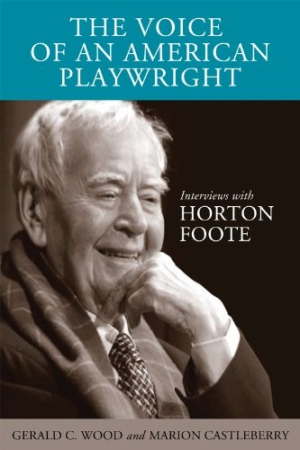The Voice of an American Playwright
Interviews with Horton Foote
In 1962, a young Texas playwright named Horton Foote adapted one of the South’s greatest novels, Harper Lee’s To Kill a Mockingbird, and won an Academy Award for Best Screenplay. Already a prolific playwright in his own right, Foote gained national prominence with this award, and he soon etched screenplays for movies such as Baby, the Rain Must Fall and Hurry Sundown. By the early 1980s, the award-winning movies Tender Mercies and The Trip to Bountiful propelled his career even more rapidly. When Foote died in March 2009, the theater lost an eloquent voice whose insights into human nature grew out of his own upbringing in a South divided by racism and poverty.
In this welcome and thoughtful collection, editors Wood (vice-president of the Horton Foote Society) and Castleberry (founding president of the Horton Foote Society) gather twenty-five interviews from over the course of their subject’s life and allow us to hear again Foote’s eloquent, kind, engaging, and thoughtful voice. The topics of the interviews range over his work in film and television; his thoughts about his Christian Science faith; his deep love for his wife and collaborator, Lillian, and his family; and his struggles to stage his magnum opus, The Orphans’ Home cycle.
In examples such as this, Foote offers helpful thoughts on writing, editing, and rewriting: “I have this thing about putting drafts in a drawer. I think a drawer is very magical and sometimes there is no point in forcing it. I’m a great believer in the ‘refrigeration process’. Put it away and sometimes something happens to it; sometimes it sprouts, sometimes it diminishes.”
Foote loved younger playwrights and helped them whenever he could, counseling them to “just search your heart and see what you really want to write about, and then write about it….You just have to listen to your inner voice.”
Foote also reflects on the nature of the “tender mercies” that are so often a central theme in his plays: “I had a long, hard time struggling with the word grace … I think there is God’s grace. It’s a gift … and I think it comes to us in many forms, in many ways.”
Wood and Castleberry’s lovingly crafted collection of interviews offers a tribute to one of America’s greatest cultural treasures, reminding us of our deep loss of a great artist but celebrating a man whose tender mercies we’ll never forget.
Reviewed by
Henry Carrigan
Disclosure: This article is not an endorsement, but a review. The publisher of this book provided free copies of the book to have their book reviewed by a professional reviewer. No fee was paid by the publisher for this review. Foreword Reviews only recommends books that we love. Foreword Magazine, Inc. is disclosing this in accordance with the Federal Trade Commission’s 16 CFR, Part 255.

